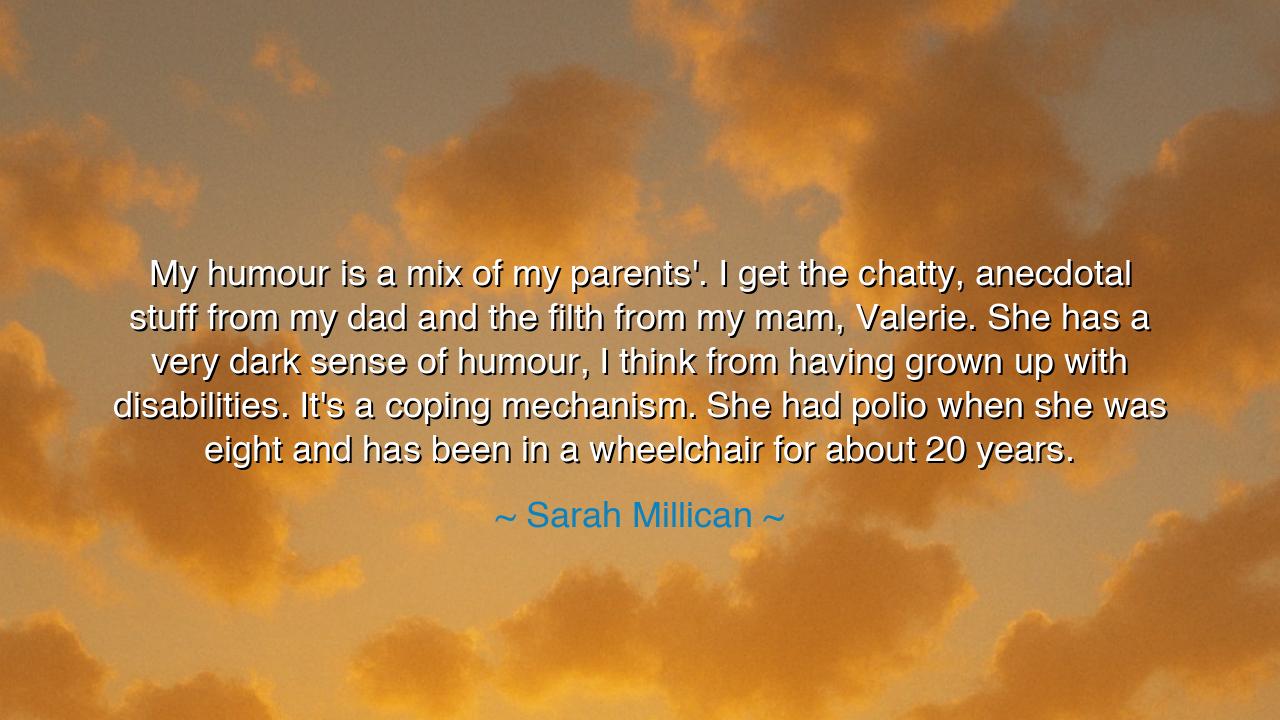
My humour is a mix of my parents'. I get the chatty, anecdotal
My humour is a mix of my parents'. I get the chatty, anecdotal stuff from my dad and the filth from my mam, Valerie. She has a very dark sense of humour, I think from having grown up with disabilities. It's a coping mechanism. She had polio when she was eight and has been in a wheelchair for about 20 years.






“My humour is a mix of my parents’. I get the chatty, anecdotal stuff from my dad and the filth from my mam, Valerie. She has a very dark sense of humour, I think from having grown up with disabilities. It's a coping mechanism. She had polio when she was eight and has been in a wheelchair for about 20 years.” — Sarah Millican.
Thus spoke Sarah Millican, the jester-sage of our time, whose laughter carries both the weight of suffering and the lightness of resilience. In her words lies a profound truth — that humour is not merely a tool for entertainment, but a weapon of the spirit, forged in hardship and sharpened by love. She honors her parents, not simply as her blood, but as the twin architects of her voice — her father, who gave her the rhythm of storytelling, and her mother, who taught her to laugh in the face of pain. Together they made her not only funny, but brave. For laughter, when born of struggle, is not weakness; it is rebellion — the soul’s refusal to surrender to despair.
The origin of this quote rests in Millican’s reflections on her family and upbringing in South Shields, England. She grew up in an ordinary home, filled with warmth, wit, and the kind of humor that binds rather than wounds. Her mother, Valerie, having survived polio as a child, carried the scars of illness but refused to let them define her. Instead, she turned her suffering into strength, her vulnerability into wit. Through humor, she took back what fate had tried to take from her — her power. From this wellspring of maternal courage, Sarah inherited a dark sense of humor, one that dares to find light where others see only shadow. And from her father, she gained the gift of story — the ability to weave laughter from memory and make others feel less alone.
This blend — the chatty warmth of her father and the fearless edge of her mother — gave birth to a humor both intimate and defiant. In her mother’s laughter, Millican saw the ancient art of coping through comedy, a practice as old as humanity itself. From the jesters of medieval courts to the soldiers in muddy trenches, laughter has always been the final sanctuary of the human soul. It is the alchemy of resilience, transforming pain into power, tragedy into triumph. What her mother taught her, without sermon or philosophy, was that laughter can rebuild what suffering seeks to destroy.
The ancients understood this too. Among the Stoics, it was said that the wise man does not deny pain, but masters his reaction to it. Epictetus, himself a slave crippled by his master’s cruelty, taught that while the body may be broken, the spirit remains free. In Millican’s mother, we see this same truth — that disability need not mean defeat, and that humor, born of hardship, can lift the heart above the confines of the body. Where others might see only limitation, she found expression; where others might weep, she chose to laugh. Such laughter is not frivolity — it is courage made audible.
Consider also the story of Frida Kahlo, the painter who turned her lifelong pain into color and irony. Crippled by polio as a child and later bound to her bed by an accident, she painted not to escape suffering but to converse with it. Like Millican’s mother, Kahlo infused her art with wit, sensuality, and defiance — a dark humor that mocked fate itself. For both women, creativity and laughter became the same act: the reclaiming of self from the hands of suffering. Thus, humor is not the absence of pain, but the art of living with it without being consumed.
Millican’s reflection also reveals the sacred inheritance of spirit that flows between generations. Her mother’s resilience became her own; her father’s kindness gave her voice. This is the quiet miracle of family — that strength, like fire, can be passed from heart to heart, each life warming the next. Her humor is not hers alone; it is the echo of her parents’ survival, laughter shaped by love, shadowed by endurance. It reminds us that every joke carries within it a story, and that the stories we tell about our pain define how we rise from it.
So let this be the lesson of Sarah Millican’s words: Cherish the humor that grows from hardship, for it is the truest sign of strength. Do not scorn the dark laugh — it is the soul’s armor. When life wounds you, learn to speak to your pain in the language of wit, for laughter disarms despair. And if you are blessed, as she was, with those who teach you to face the world with grace and defiance, carry their fire forward. For the world will always have its deserts of suffering — but humor, born of love and courage, will always be the oasis that keeps the heart alive.
And remember always: in the laughter of the broken, there lies a strength that no sorrow can conquer.






AAdministratorAdministrator
Welcome, honored guests. Please leave a comment, we will respond soon